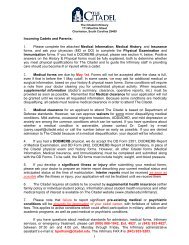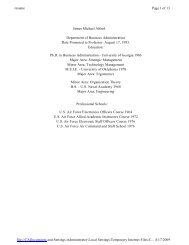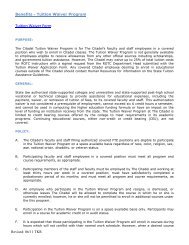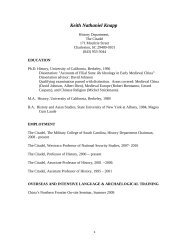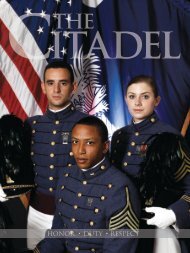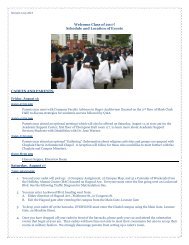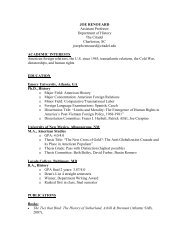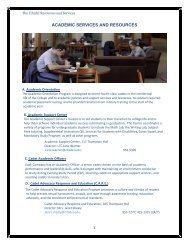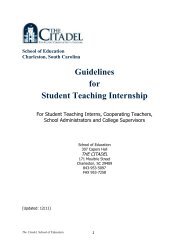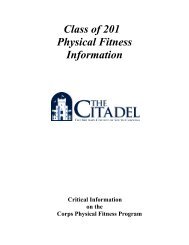Honor • Duty • Respect - The Citadel
Honor • Duty • Respect - The Citadel
Honor • Duty • Respect - The Citadel
- No tags were found...
Create successful ePaper yourself
Turn your PDF publications into a flip-book with our unique Google optimized e-Paper software.
Photo courtesy of Grace Beahm, <strong>The</strong> Post & CourierCapt. Brian Brennan, USA, ’06Tango Company, Criminal Justice majorColumbus, Ga.In May 2006, Brian Brennan walked across the stage of McAlisterField House to accept his diploma. Two years later, he could notwalk at all.As a member of the Army’s 101st Airborne Division, Brennan leftfor Afghanistan to serve his country as a platoon leader with the506th Infantry Regiment in the spring of 2008. Just two monthsinto his deployment, Brennan’s vehicle struck an improvisedexplosive device. <strong>The</strong> blast ripped through his Humvee and flungthe New Jersey native about 40 feet. <strong>The</strong> explosion collapsed hislung, shattered his femur, ruptured his spleen and caused severebrain injury and internal bleeding.He was rushed to a field hospital and, within hours, doctors hadamputated both his legs—one above the knee, the other below.Three surgeries and three weeks later, Brennan was still utterlyunresponsive. <strong>The</strong>n, a special visitor arrived while Brennan wasin the care of Walter Reed Army Hospital. Gen. David Petraeus,then the head of U.S. Central Command, paused by Brennan’sbedside hoping to wake the wounded vet from his coma.Brennan at first did not react to the commander’s presence orhis kind and encouraging words. Petraeus started to walk away,but just before he left, he took another shot at rousing Brennan.“Currahee,” he muttered, and, to his amazement, saw Brennanstir. “Currahee!” Petraeus repeated with vigor. Brennansquirmed in his bed and moved his head in what witnesses saywas a clear reaction to hearing his unit’s motto.This remarkable moment set the groundwork for a tough butsuccessful recovery. Fitted with prosthetics and learning toadapt to a new life, <strong>The</strong> <strong>Citadel</strong> graduate has used his struggleto hearten other wounded veterans. His determination to helpthose facing similar tough times has led to the creation of theBrennan Stands Alone Foundation. Now, Brennan helps veteransinjured in the line of duty to find treatment, rehabilitation and,most importantly, hope.Recognized for his courage, Brennan credits <strong>The</strong> <strong>Citadel</strong> fortraining him to face adversity and move forward. In 2009, theNew Jersey Hall of Fame inducted 14 people, including singer JonBon Jovi and comedian Jerry Lewis. Petraeus, a surprise guest atthe star-studded event, introduced Brennan as the first UnsungHero Award recipient. Met with the longest standing ovation ofthe evening, Brennan walked across the stage to accept the honorand stood tall beside the man who woke him with one word.Currahee, fittingly, is a Cherokee word meaning “we standalone together.”Dr. Anthony D. Cicoria, ’74Charlie Company, Biology majorOneonta, N.Y.<strong>The</strong> day began innocently. It was 1994 and Dr. Anthony Cicoriaand his wife were celebrating her family’s reunion in a verdantlandscape just outside Albany, N.Y. No one could imagine thisbucolic scene of smiling faces and smoking barbecue would spiralinto a traumatic and life-changing event.Cicoria, an orthopedic surgeon and a 1974 graduate, took amoment from the celebration to call his mother from a payphone.Overhead, the beginnings of a thunderstorm brewed. At themoment Cicoria hung up the phone, a bolt of lightning struck theearth just inches from where he stood. He heard a sharp crack,then felt a force whip his body to the ground.Cicoria recalls an out-of-body experience, seeing himself lying onthe ground with a bluish-white light glowing around his body. Anurse who had been waiting in line to use the phone resuscitatedCicoria, bringing him out of the dream-like state into the throesof extreme pain.Three weeks after the incident, Cicoria was feeling sluggish andworried that he suffered from memory loss. A neurological examdetermined that he was fine and life could continue as normal.What happened next was anything but normal. Suddenly, Cicoriabecame overwhelmed with an incredible urge to hear pianomusic. <strong>The</strong> motorcycle-driving, Hawaiian-shirt-wearing doctorusually listened to rock. Nonetheless, he purchased a CD ofVladimir Ashkenazy playing Chopin. He was promptly enamoredto the point of obsession. Next, he bought sheet music, thoughhe had not had a piano lesson since he was a little boy.Soon, Cicoria spent all his free time learning to play, waking upat 4 a.m. to get in a couple of hours before work and returningto the keys after his children went to bed. During the few hoursof sleep he did get, he would dream that he was dressed in atuxedo performing a concert of his own music.In time, Cicoria turned his dream into reality, recently wowinga crowd at <strong>The</strong> <strong>Citadel</strong> for a concert during Charleston’sinternational performing arts festival. He played with anorchestra alongside another unlikely musician—opera singerMorris Robinson, a 1991 <strong>Citadel</strong> graduate. Both musiciansplayed in Johnson Hagood Stadium before, not as musicians, butas college football athletes. And, both were named among theSouthern Conference’s best linemen during their time.Sometimes, it seems, lightning does strike twice.<strong>The</strong> <strong>Citadel</strong> 2011 55



